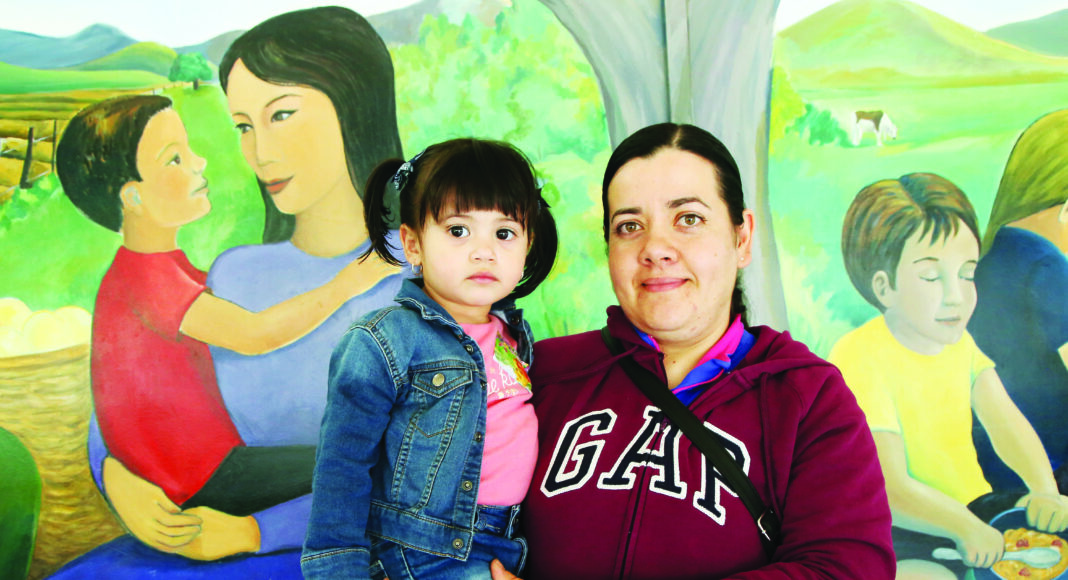María Olvide Lozano’s 2-year-old daughter stomps around as her mother sits in the lobby of the Women, Infants and Children (WIC) program at Community Bridges in Watsonville. It’s 5pm on a Tuesday and the pair are the only clients here as staff wraps up for the day.
Olvide Lozano is here for the monthly assistance provided by WIC to access healthy nutrition for her toddler. Leafy greens poke out of the bag that she received moments before as part of her food aid.
“They teach us how to give [our children] a balanced diet. Something that sometimes we don’t know about,” Olvide Lozano says in Spanish about the program. “So then I try to give them more vegetables, more fruits, less bread, less junk food.”
Olvide Lozano works as a blackberry picker on a local farm. She came to the area nine years ago from Jalisco, Mexico and has received WIC assistance for both of her children through Community Bridges for the past eight years.
The local non-profit is leading a new engagement effort that targets farmworkers like Olvide Lozano. The program received federal funding earlier this summer to embark on their project to enroll more immigrant and farmworker families in WIC. It’s a daunting task, however, and the organization will have to break through misconceptions and fears entrenched in the community.
Brief History
In 1972, the federal WIC program began as a pilot supplemental food program aiming to improve the health of pregnant mothers, infants and children in response to malnutrition among many poor mothers with young children. By 1975 the program was permanent. Over the years, federal legislation introduced various elements to the program, including nutrition education, breastfeeding support and social services referrals.
Community Bridges opened its WIC program in February 1977. Currently, it serves more than 800 pregnant women, 900 breastfeeding women, 1,600 infants and 5,000 children across Santa Cruz County. It assists participants with nutrition education, breastfeeding education and health care referrals, among other services.
The WIC Community Innovation and Outreach Project (WIC CIAO) grant is awarded to 36 programs nationwide and the WIC program here is one of its distinguished recipients. The award is given to organizations involved in efforts to develop innovative outreach strategies to boost awareness and participation in the program.
The non-profit applied for this grant to help expand reach to immigrant and farmworker families and increase WIC enrollment in the area. Out of 84 California agencies providing WIC assistance, Community Bridges’ program was one of only two in the state to be awarded the WIC CIAO and received $244,189 for an 18 month-long project. Dana Wagner, the WIC Program director, is honored to receive the award and emphasizes that it was a team effort for the organization.
“I just knew that there were families that were likely eligible who just weren’t receiving services … and it connected so much to my values and the values of Community Bridges that I just want to provide the assistance to families that are eligible for services,” Wagner says. “WIC has a proven track record of helping families and helping them have healthier outcomes and I just wanted to make the services available. So when I saw this opportunity I just said ‘yes let’s go for it.’”
Community Bridges is planning on strengthening its partnerships with its Child and Adult Care Food Program (CACFP) and the Center for Farmworker Families to “address barriers and misconceptions about participating in the WIC program,” according to a press release.
Risking It All
Dr. Ann Lopez, Executive Director of the Center for Farmworker Families, works with the local immigrant and farmworker population. She stresses the importance of meeting them where they are, as many are afraid of institutions for fear of deportation.
“People are very reticent to go anywhere that looks like an institutional setting even if there is tremendous benefit. The organizations must come to the workers and not vice-versa,” Dr. Lopez says.
The Center for Farmworker Families holds a bimonthly food distribution for undocumented farmworkers in a clandestine location in the Watsonville area. It’s set up this way so participants feel safe and comfortable, according to Dr. Lopez.
“I’ve learned firsthand that people would rather starve than risk deportation,” she says.
The fears these families have are not unfounded.
A Trump-era policy called the “public charge” rule made it so immigrants could be denied permanent resident status if they had received or were expected to receive public benefits, including food assistance. In 2021 the Biden administration reversed that policy. Senate Republicans have recently passed a resolution to reinstate the public charge rule, but President Biden is expected to veto it.
As it stands, receiving federal benefits like WIC currently do not affect immigrants’ status or prospective citizenship. Now that they have received the prestigious award, Community Bridges is ready to dispel myths and expand their reach.
“I am honored and thrilled to have been chosen for this opportunity to engage more families in the Pajaro Valley and surrounding area with WIC,” says Wagner. “I want to let families know that WIC is a safe place, that it is easy to apply for services and that we are here to assist with a variety of services to improve health and well-being. Food access knows no boundaries, nor does it care about citizenship requirements.”













